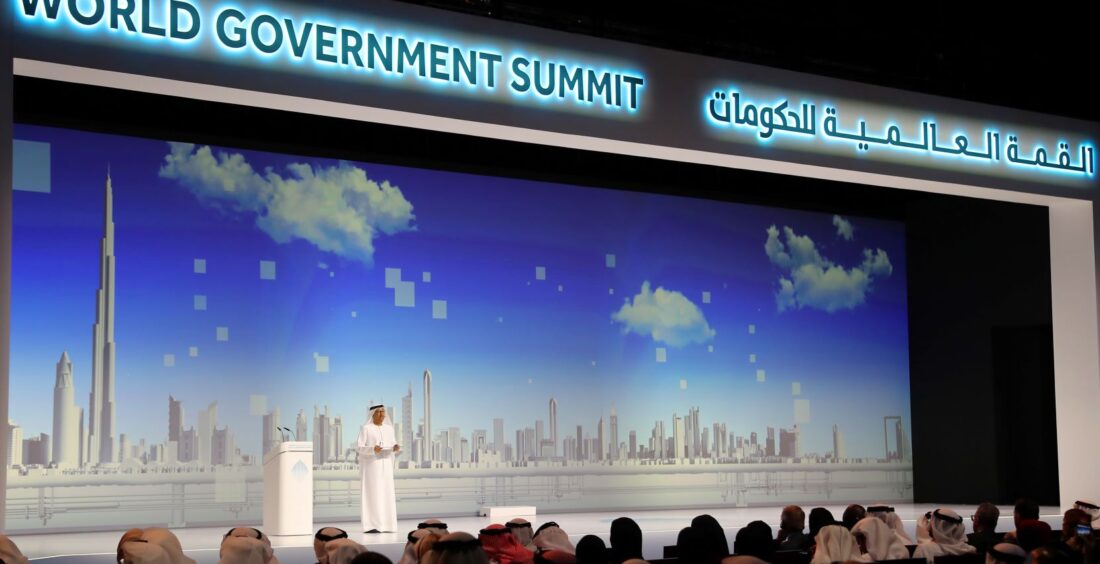His Excellency Dawoud Al Hajri, Director General of Dubai Municipality, presented future trends that are expected to shape the cities of the future. He highlighted these during a lecture titled, ‘Cities of the future…cities without limits’ on the sidelines of the World Government Summit, which was held in Dubai.
Al Hajrisaid: “In order to empower the future, leaders and governments must consider how closely cities match the goals and aspirations of the population, and how to keep up with all the rapid changes, as well as the necessity of having cities that are brimming with economic and developmental opportunities. Dubai adheres to the vision of H.H. Sheikh Mohammed bin Rashid Al Maktoum, Vice President, Prime Minister of the UAE, and Ruler of Dubai, who stated that a positive leader closes his eyes before starting work and envisions future accomplishments in all their beauty and detail, and can feel the outcome.”
“We are in an everlasting race to develop cities as we lead a fast life with frequent changes in the global economy, politics, and environment. Eventually, change becomes a constant factor in the lifespan of cities,” he pointed out.
“The future is closer than we imagine, and its evidence is strongly present in our daily lives. There are important trends that are expected to help shape the cities of the future in the coming years. These trends are based on five main pillars: technological developments across the globe, future of food security, growth of the construction industry, energy production, and recovery of environmental ecosystems. Achieving these objectives ensure a better future for humanity,”Al Hajri added.
Global Technological Acceleration
H.E. discussed the rapid advancements in technology and its effects on the establishment of cities of the future, the expanding role of Artificial Intelligence (AI), as recently demonstrated by ChatGPT, as well as the Internet of Things(IoT), Digital Twinning of cities, and the Metaverse, all of which are poised to enhance human happiness and welfare.
The Future of Global Food Security
Al Hajri further emphasised the future of global food security, which has been a priority for governments. H.E. underlined the need to think of more sustainable ways to achieve food security by focusing on food sciences and technologies to secure alternate food supplies, such as using seaweed as a primary source of protein and animal cells to produce meat.
H.E. added: “In order to support the future of food security and assist us in mitigating the challenges, Dubai has started to rely on urban agriculture and support and develop vertical and water agriculture initiatives.”
Construction Industry
Al Hajri also drew attention to the future direction of construction industry, asserting that after more than a century of expansion in this sector, significant funding, rising real estate demand, and infrastructure expenditures, is now essential to continue this segment’s growth in the future. Increasing efficiency and lowering CO2 emissions will support this progress, which aims to improve peoples’ comfort and happiness,” he said.He added that governments and private sector companies must adapt to future new drivers and opportunities.
Energy Production
In addition, H.E. emphasised that energy production is one of the key areas that will shape the cities of the future. “It is anticipated that by the year 2050, the average home’s electricity usage will rise by about 75 per cent, necessitating the use of more environmentally friendly and sustainable alternatives in order to meet demands in light of global warming and various countries’ energy crises,” HE added.
Al Hajrifurther stated: “In the United Arab Emirates, sustainable energy is given top priority, and it has become the major focus of many government initiatives and projects. With the theme ‘Today for Tomorrow,’ H.H. Sheikh Mohamed bin Zayed AL Nahyan recently declared 2023 to be the ‘Year of Sustainability’ in the UAE. This declaration supports the UAE’s local, regional, and global efforts to debate sustainability-related topics and concerns and coincides with the UAE hosting COP 28.”
Environmental Ecosystems
Concluding his speech on the directions for building future cities, H.E. shed light on the restoration of environmental ecosystems and its effect on quality of life, and its role in creating the ideal environment for the production of food and water required by the growing population. He also spoke about how coordinated actions on a global scale are the primary means of reducing the degradation of the environmental ecosystem.
“You may be thinking now, what is a limitless city,” he asked, referring to the existing model supplied by the Emirate of Dubai for the cities of the future and limitless cities. He added: “Because Dubai’s leaders believed in the future, saw it coming, and took action on it, the emirate has proven to the rest of the world that it is an unstoppable metropolis setting high benchmarks and serving as an inspiration to the rest of the globe by exceeding citizens’ expectations and working to fulfil their ambitious dreams,” said Al Hajri.
H.E. concluded by highlighting the significance of Dubai Municipality’s participation in international dialogues, such as the World Government Summit, which is regarded as the largest governmental congregation to address the issues of the future and methods of conducting government business.






Comments are closed.